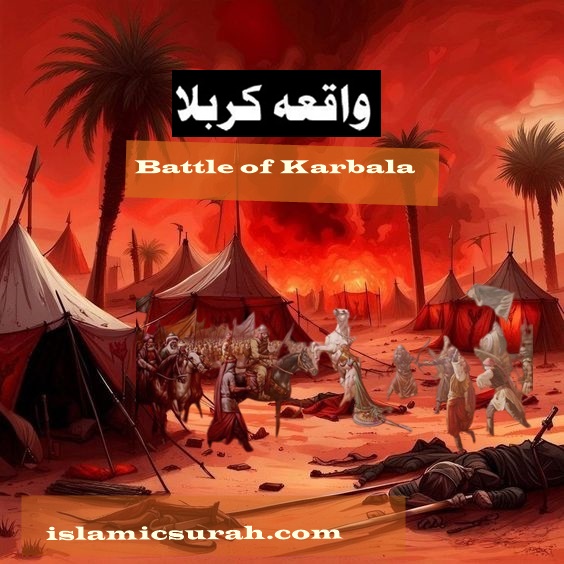
10 Muharram
10 Muharam Ul Haram /Ashoora
The Day of Ashura (10 محرم) falls on the 10th of Muharram 2024, a significant holy day in Islam observed on the 10th day of the first Islamic month.
The term Ashura comes from the Arabic word, which means ten. Muharram is one of the four sacred months of Islam in which fighting is forbidden.
Other Islamic Events in Muharram
Muharram ul Haram is a very important month for Muslims because many significant Islamic events have taken place during this month.
1st Muharram,The day Hazrat Umar Farooq (R.A) passed away
On this day the Prophet Nuh (as) and his companions left the Ark
10th Muharram: Battle of Karbala
Allah (SWT) freed Musa (as) and the Children of Israel in Muharram
10th Muharram and Sayyiduna Aadam عَـلَيْـهِ الـسَّـلَام: His repentance was accepted on this day.
Incident of Karbala
The most notable event in the month of Muharram was the Karbala Battle , which occurred on 10 Muharram 61 AH (9/10 October 680 CE) in the place of karbala near the Euphrates River, Iraq.

The Story of Karbala
This battle occurred between the family and companions of Hussain ibn Ali (R.A.), the grandson of the Prophet Muhammad (PBUH) and son of the fourth caliph, Ali ibn Abi Talib (R.A.), and the military forces dispatched by Yazid ibn Muawiyah, the Umayyad Caliph at that time.
Hassan’s Peace Treaty with Muawiya
After the assassination of the fourth caliph, Imam Ali (a), in 661, a power vacuum emerged, allowing Muawiya to assume the role of caliph. This occurred despite opposition from a segment of the Ummah, who wanted Hassan (a), the son of Ali and grandson of the Prophet, to be the caliph.
To prevent further bloodshed after years of conflict, Hassan (a) signed a peace treaty with Muawiya. This treaty stipulated that Muawiya would not appoint a successor after him, and Hasan would become caliph after Muawiyah. If anything happens to Hasan, then the leadership will be taken over by Hasan’s little brother, Hussain (R.A.).
The Breach of the Hasan-Muawiyah Treaty
However, Muawiyah breached the treaty. When Hasan (R.A.) was poisoned and died, Muawiyah passed his leadership to his own son, Yazid ibn Muawiyah, instead of to Husayn.
Hussain’s Rejection of Yazid’s Authority
Yazid extended his power through corruption, bribery, and violence. He sent the governor of Madina to obtain allegiance from Hussain ibn Ali (R.A.), but Hussain (R.A.) refused and relocated to Makkah with his family.
Hussain’s Consideration of Kufa’s Invitation
While in Makkah, Hussain (RA) received numerous letters urging him to come to Kufa. The dissatisfied people of Kufa requested that Husayn join them and pledged allegiance to him instead of Yazid’s leadership. Finally, Hussain (R.A.) dispatched Muslim bin Aqil (R.A.) to assess the situation in Kufa. Upon arrival, Muslim informed Hussain (R.A.) via letter that the people of Kufa were eager to receive him.
Hussain’s Journey to Kufa
Upon learning of Muslim ibn Aqil’s (R.A.) presence in Kufa, Yazid ordered his execution and replaced the governor, Numan ibn Basheer, with Ubaidillah ibn Ziyad. Despite being unaware of these changes in Kufa, Hussain (RA) proceeded towards the city. On 8 Dhul al-Hijjah 60 AH (9 September 680 CE), Imam Hussain (R.A.) and his 128 companions departed from Medina for Kufa. It was during their journey that news reached them about Muslim ibn Aqil’s (R.A.) death, yet Hussain (RA) chose to continue onward to Kufa.
Abbas ibn Ali’s Heroic Sacrifice at the Euphrates
Eventually, when Abbas ibn Ali (R.A) went to the river to fetch water for the children in Hussain’s camp, he found himself surrounded by hundreds of soldiers intent on preventing him from obtaining water.
He was forcibly pulled from his horse, and in the ensuing attack, both of his arms were severed, leaving him to grasp the water bags with his teeth. Despite facing a barrage of stones and arrows from all directions, he continued running to deliver the water until an arrow struck the water bags, causing them to spill. At that moment, he began to lose hope until a blow to his head brought him to the ground.
Hussain (R.A) rushed to his side immediately, and Abbas (R.A) breathed his last in Hussain’s lap.
The Final Stand of Hussain ibn Ali at Karbala
The battle began with Hussain’s roughly 70 companions facing an army estimated by many historians to number 30,000. One by one, Hussain’s companions fought bravely and were martyred on the battlefield. Eventually, Hussain (a) was left with only a few remaining family members, who too were slain.
Alone and desperate, Hussain (a) appealed to the enemy forces for water for his six-month-old baby. In response, the enemy callously shot a fatal arrow that killed the infant in Hussain’s arms. Hussain (a) buried his child and said farewell to the women and children in his camp. He then courageously charged into the battlefield, fighting fiercely until he fell from his horse and was surrounded by enemy soldiers.
The grandson of the Prophet (pbuh&hf) endured brutal attacks from all directions and was ultimately beheaded.
The battlefield of Karbala became a symbol of ultimate sacrifice, as Imam Husain and his companions embraced martyrdom for the principles of justice and righteousness. Their sacrifice left an indelible mark on the hearts of the faithful. However, the story does not end with their martyrdom. The events that followed further exemplify the resilience and unwavering faith of the Ahlul Bayt. As we transition to Part 2, we will explore the harrowing journey of the survivors and the enduring legacy of Karbala.
Read more in Part 2 about….
Imam Hussain Karbala
Iraq karbala

